
Title: The Importance of Personalization in Digital Marketing
As a digital marketing company, we understand the importance of delivering personalized experiences to our clients' customers. Personalization is the process of tailoring marketing messages and experiences to the specific needs and preferences of individual customers. With the rise of big data and machine learning technologies, it's now easier than ever to personalize digital marketing campaigns.
Why is personalization so important in digital marketing? Here are a few reasons:
It improves customer experience: Customers are more likely to engage with marketing messages that are relevant to their interests and needs. Personalization can help create a positive experience for customers and make them more likely to become loyal to your brand.
It increases conversion rates: When customers feel like your marketing messages are speaking directly to them, they are more likely to take action. Personalization can help increase conversion rates by making your marketing more effective.
It helps you stand out: In a crowded digital landscape, personalization can help your brand stand out from the competition. By delivering targeted messages and experiences, you can differentiate your brand and build a stronger relationship with customers.
So how can you incorporate personalization into your digital marketing strategy? Here are a few tips:
Use data to understand your customers: Collect data on your customers' behavior and preferences, and use this information to create personalized marketing messages.
Segment your audience: Divide your audience into different segments based on factors like age, location, interests, and buying behavior. This will allow you to create targeted messages for each group.
Use dynamic content: Use technology to create dynamic content that changes based on the user's behavior or preferences.
Personalize the customer journey: Create personalized experiences at every stage of the customer journey, from the first visit to your website to the final purchase.
In conclusion, personalization is a key ingredient in successful digital marketing. By delivering personalized experiences to your customers, you can improve their experience, increase conversion rates, and stand out from the competition. If you're not already incorporating personalization into your digital marketing strategy, now is the time to start!
Title: How to Measure the Success of Your Digital Marketing Campaigns
Measuring the success of your digital marketing campaigns is essential for determining whether you're meeting your goals and making progress towards your overall business objectives. Here are some key metrics you can use to measure the success of your digital marketing campaigns:
Website Traffic: One of the most basic metrics for measuring the success of your digital marketing campaigns is website traffic. You can track the number of visitors to your website, how long they stay, and which pages they visit.
Conversion Rates: Conversion rates measure how many website visitors take a desired action, such as making a purchase or filling out a form. Tracking conversion rates can help you determine whether your digital marketing campaigns are effective in driving sales or generating leads.
Cost Per Acquisition: Cost per acquisition (CPA) measures how much it costs you to acquire a new customer or lead. This metric can help you determine whether your digital marketing campaigns are cost-effective.
Return on Investment: Return on investment (ROI) measures the amount of revenue generated from your digital marketing campaigns compared to the amount spent. ROI is a key metric for determining the overall success of your campaigns.
Social Media Engagement: Social media engagement measures how many likes, shares, and comments your social media posts receive. This metric can help you determine whether your social media marketing efforts are resonating with your audience.
Email Open and Click-Through Rates: If you're using email marketing as part of your digital marketing strategy, tracking open and click-through rates can help you determine whether your email campaigns are effective.
Search Engine Rankings: If your digital marketing campaigns include search engine optimization (SEO), tracking your search engine rankings for targeted keywords can help you determine whether your SEO efforts are paying off.
In conclusion, measuring the success of your digital marketing campaigns is crucial for understanding whether your efforts are effective and making progress towards your business goals. By tracking these key metrics, you can gain valuable insights and optimize your campaigns for better results.